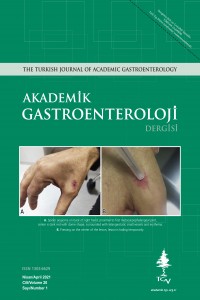Öz
Spontan bakteriyel peritonit intra-abdominal cerrahi öyküsü olmaksızın asit sıvısında bakteriyel enfeksiyon görülmesidir ve asitin ölümcül bir komplikasyonudur. Spontan bakteriyel peritonit tanısı genelde sirozlu hastada, karın ağrısı, hepatorenal sendrom gibi dekompanzasyon olduğunda ya da rutin yapılan parasentezde nötrofil sayısının 250/mm3 ve üzerinde olması ile konur. Sıklıkla etken mikroorganizmalar enterik gram negatif bakterilerdir. Tedaviye bu mikroorganizmalara yönelik ampirik olarak başlanır ve kültür sonucuna göre revize edilebilir. Listeria monocytogenes spontan bakteriyel peritonitin nadir görülen etkenidir. Gram pozitif, fakültatif anaerob basildir ve özellikle neonatallerde, yaşlı ve immünsuprese kişilerde enfeksiyona yol açar. Diğer enfeksiyonların genel bir bulgusu olan ateş, spontan bakteriyel peritonitli hastada genellikle görülmez. Biz bu yazımızda asit ve periferik ödem şikayetiyle yatırılan, kriptojenik karaciğer sirozu tanısı konulan, altmış yedi yaşında bayan hastada ampirik olarak tedavi edilirken karın ağrısı ve ateşi olması nedeniyle alınan asit sıvısında Listeria monocytogenes üreyen vakamızı sunduk. Spontan bakteriyel peritonit ampirik olarak tedavi edilirken ateşi çıkan hastanın alınan asit kültüründe ve kan kültüründe Listeria monocytogenes üredi. Listeria monocytogenes’in nadir görülen bir patojen olduğu bilinmesine rağmen bizim vakamızda olduğu gibi yaş ve kronik hastalık gibi faktörler görülme sıklığını arttırabilir. Ampirik tedaviye yanıt vermeyen veya tedavi sırasında ateş gibi sistemik belirti gösteren spontan bakteriyel peritonitli hastalarda çok nadir olmasına rağmen Listeria monocytogenes akla gelmelidir.
Anahtar Kelimeler
Kaynakça
- 1. EASL Clinical Practice Guidelines for the management of patients with decompensated cirrhosis. J Hepatol 2018;69:406-60.
- 2. Kowdley K. Spontaneous bacterial peritonitis. Gastroenterol Hepatol (NY) 2015;11:70-2.
- 3. Hutchison JG, Runyon BA. Spontaneous bacterial peritonitis. In: Surawicz CM, Owen RL, editors. Gastrointestinal and Hepatic Infections. Philadelphia, PA, USA: WB Saunders; 1995.
- 4. Ayaydın Z, Aktar GS, Onur AR, ve ark. Seyrek izole edilen bir etken: Listeria monocytogenes. Türk Mikrobiyol Cem Derg 2017;47:146-50.
- 5. Yecies T, Inagami S. Spontaneous bacterial peritonitis caused by Listeria monocytogenes associated with ascitic fluid lymphocytosis: A case report and review of current empiric therapy. Case Reports in Hepatol 2013;2013:832457.
- 6. Kartali G, Tsivitanidou M, Nikolaidis N, et al. Spontaneous bacterial peritonitis caused by Listeria monocytogenes. Ann Gastroenterol 2001;14:63-4.
- 7. Shaikh B, Pathak R, Mainali NR, Gupta S. Listeria monocytogenes as a cause of spontaneous bacterial peritonitis: a rare entity. J Community Hosp Intern Med Perspect 2015;5:26153.
- 8. Albillos A, Lario M, Alvarez-mon M. Cirrhosis-associated immune dysfunction: Distinctive features and clinical relevance. J Hepatol 2014;61:1385-96.
- 9. Cardoso C, Cremers I, Oliveira AP. Spontaneous bacterial peritonitis caused by Listeria monocytogenes: a case report and literature review. Ann Hepatol 2012;11:955-7.
Öz
Spontaneous bacterial peritonitis is a bacterial infection in ascitic fluid without a history of intra-abdominal surgery and is a fatal complication of ascites. Spontaneous bacterial peritonitis is usually diagnosed when a cirrhotic patient has abdominal pain or when a patient with cirrhosis decompensates, such as hepatorenal syndrome, or when routine paracentesis is performed. The diagnosis is established when the neutrophil count is ≥250/mm3. The causative microorganisms are often enteric Gram-negative bacteria. Spontaneous bacterial peritonitis is treated empirically, and the treatment can be revised according to the culture result. Listeria monocytogenes is a rare cause of spontaneous bacterial peritonitis. It is a Gram-positive facultative anaerobe bacillus that causes infections, particularly in neonates, the elderly, and immunocompromised individuals. Fever, a common finding of other infections, is not usually seen in patients with spontaneous bacterial peritonitis. In this case report, we present a case of a 67-year-old female hospitalized with complaints of ascites and peripheral edema and who was diagnosed with cryptogenic liver cirrhosis. Listeria monocytogenes grew in ascitic fluid recovered during empirical treatment due to fever. While the spontaneous bacterial peritonitis was being treated empirically, Listeria monocytogenes grew in ascites and blood cultures of the patient, who developed fever and recovered after a change in treatment. Although Listeria monocytogenes is a rare pathogen, factors, such as age and chronic disease, may increase its incidence, as in our case. Listeria monocytogenes should be considered in patients with spontaneous bacterial peritonitis who do not respond to empirical treatment or who show systemic symptoms, such as fever, during treatment.
Anahtar Kelimeler
Listeria monocytogenes spontaneous bacterial peritonitis cirrhosis
Kaynakça
- 1. EASL Clinical Practice Guidelines for the management of patients with decompensated cirrhosis. J Hepatol 2018;69:406-60.
- 2. Kowdley K. Spontaneous bacterial peritonitis. Gastroenterol Hepatol (NY) 2015;11:70-2.
- 3. Hutchison JG, Runyon BA. Spontaneous bacterial peritonitis. In: Surawicz CM, Owen RL, editors. Gastrointestinal and Hepatic Infections. Philadelphia, PA, USA: WB Saunders; 1995.
- 4. Ayaydın Z, Aktar GS, Onur AR, ve ark. Seyrek izole edilen bir etken: Listeria monocytogenes. Türk Mikrobiyol Cem Derg 2017;47:146-50.
- 5. Yecies T, Inagami S. Spontaneous bacterial peritonitis caused by Listeria monocytogenes associated with ascitic fluid lymphocytosis: A case report and review of current empiric therapy. Case Reports in Hepatol 2013;2013:832457.
- 6. Kartali G, Tsivitanidou M, Nikolaidis N, et al. Spontaneous bacterial peritonitis caused by Listeria monocytogenes. Ann Gastroenterol 2001;14:63-4.
- 7. Shaikh B, Pathak R, Mainali NR, Gupta S. Listeria monocytogenes as a cause of spontaneous bacterial peritonitis: a rare entity. J Community Hosp Intern Med Perspect 2015;5:26153.
- 8. Albillos A, Lario M, Alvarez-mon M. Cirrhosis-associated immune dysfunction: Distinctive features and clinical relevance. J Hepatol 2014;61:1385-96.
- 9. Cardoso C, Cremers I, Oliveira AP. Spontaneous bacterial peritonitis caused by Listeria monocytogenes: a case report and literature review. Ann Hepatol 2012;11:955-7.
Ayrıntılar
| Birincil Dil | Türkçe |
|---|---|
| Konular | Sağlık Kurumları Yönetimi |
| Bölüm | Makaleler |
| Yazarlar | |
| Yayımlanma Tarihi | 14 Mayıs 2021 |
| Yayımlandığı Sayı | Yıl 2021 Cilt: 20 Sayı: 1 |
test-5


